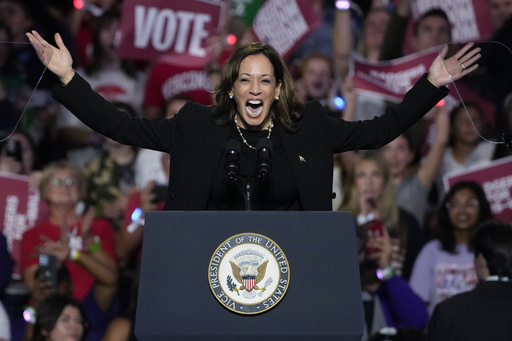
In Milwaukee, both Vice President Kamala Harris and former President Donald Trump will hold competing rallies on Friday evening, just a short distance apart. This event comes as both candidates intensify their efforts to secure votes in Wisconsin’s largest county, known for its pivotal role in presidential elections. Milwaukee boasts a significant Democratic electorate, but its surrounding suburban areas are predominantly Republican, making them crucial for Trump’s strategy as he aims to regain ground in a state that he won in 2016 but lost in 2020. The change in voter support from these suburbs during the last election contributed to his defeat.
Hilario Deleon, chairman of the Republican Party in Milwaukee County, highlighted the importance of this area by stating, “Both candidates recognize that the road to the White House runs directly through Milwaukee County.” With the upcoming Election Day approaching, these rallies may represent the candidates’ final efforts in battleground Wisconsin, where the competition for the state’s 10 electoral votes remains extremely close. Historical data indicates that four of the past six presidential elections in Wisconsin have been decided by margins narrower than one percentage point or fewer than 23,000 votes.
In the 2020 election, absentee ballots from Milwaukee, which are typically tallied early on Election Day, became instrumental in President Joe Biden’s victory in the state. Democrats acknowledge the urgency of motivating voters in Milwaukee, a city with Wisconsin’s largest Black demographic, to mitigate Trump’s advantage in suburban and rural areas. Harris aims not only to replicate but also to enhance the voter turnout seen in 2020, where 79% of Milwaukee residents cast their ballots for Biden.
Trump is focused on minimizing the Democratic lead, a tactic characterized by Deleon as a “lose by less” approach. Angela Lang, the founder of Black Leaders Organizing for Communities in Milwaukee, expressed a sentiment among many Democrats who are feeling a mix of anxiety and cautious optimism. Lang remarked on the lessons learned since the 2016 election, emphasizing the refreshed understanding among Democrats regarding the significance of Milwaukee and Wisconsin.
In a late campaign effort geared toward Black voters, former President Bill Clinton joined local faith leaders at a venue celebrating African American music and arts in Milwaukee just the night before. This outreach contrasts sharply with Hillary Clinton’s decision not to campaign in Wisconsin in 2016 after her loss in the primary, a mistake Harris is keen to avoid. Friday will mark her ninth visit to Wisconsin as a presidential contender and her fifth to Milwaukee and its suburbs. Similarly, Trump will be making his tenth visit to the state, not counting the Republican National Convention held in Milwaukee, and his third to the Milwaukee area.
Brian Schimming, chair of the Wisconsin Republican Party, suggested that Harris’s need to return to Milwaukee showcases a defensive posture, whereas Trump operates from an offensive position. According to the Milwaukee Election Commission, there is an expectation of receiving over 100,000 ballots by Election Day, though early voting numbers suggest a stronger turnout from conservative suburbs.
Ben Wikler, chair of the Wisconsin Democratic Party, noted the uncertainty surrounding voter preferences, saying, “The question no one knows the answer to is who those voters are voting for,” but expressed a hopeful outlook for Harris. Lang further pointed out that many voters from her organization typically vote on Election Day, raising concerns about the outcomes should turnout decrease. Mandela Barnes, a former lieutenant governor and president of Power to the Polls, echoed these worries, stating that a lack of voter turnout could spell significant challenges for Democrats.
Trump’s rally will take place at the same venue that hosted the Republican convention three months ago, while Harris’s gathering at the state fair park in West Allis will feature various performances, including the rapper Cardi B, who is scheduled to speak, and artists such as GloRilla, Flo Milli, MC Lyte, The Isley Brothers, and DJ GEMINI GILLY.
